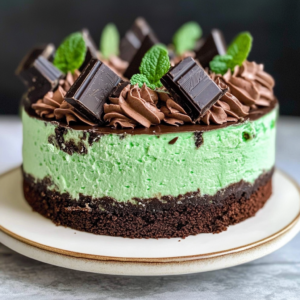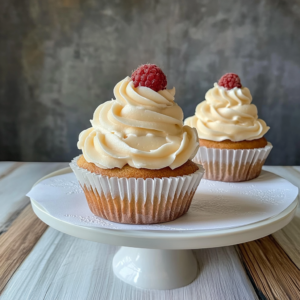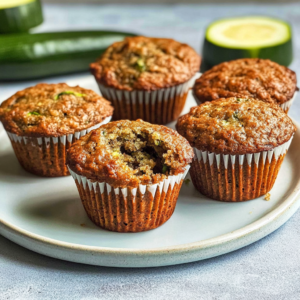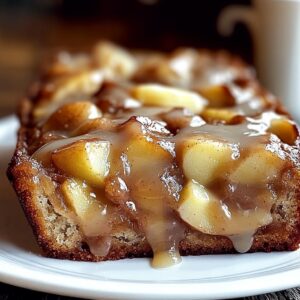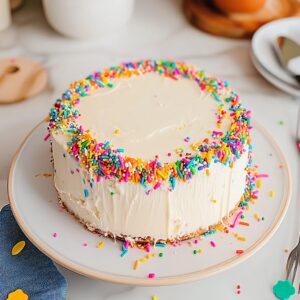Jump to:
Ultimate Guide to Rose Water Walnut Baklava Recipe
Why This Rose Water Walnut Baklava Recipe Works
Traditional Middle Eastern Flavors
The authentic taste of Rose Water Walnut Baklava embodies the soul of Middle Eastern desserts. With origins tracing back centuries, baklava is a true culinary ambassador of the region. The delicate, sweet notes of rose water complement the rich, nutty essence of walnuts, perfectly showcasing classic Middle Eastern flavors that have transcended time and borders.
Perfect Balance of Sweet and Nutty
At the heart of a successful baklava is the harmonious balance between its sweetness and nutty crunch. In this recipe, the naturally sweetened rose water syrup melds beautifully with the earthy tones of walnuts, enhanced with just the right amount of sugar. Each layer of phyllo dough is a testament to the precision needed to achieve that ideal texture, delivering a delightful crunch with every bite.
Why You'll Love This Recipe
- Bursting with authentic Middle Eastern flavors that transport you straight to its origins.
- The combination of rose water and walnuts provides a unique twist on a classic dessert.
- Despite its intricate flavors, this recipe is surprisingly straightforward and perfect for home bakers.
- Its impressive presentation makes it a show-stopping dessert for any occasion.
- Delivers a satisfying crunch and perfectly sweet finish that leaves a lasting impression.

Key Ingredients For Rose Water Walnut Baklava
Walnuts
Rich in flavor and texture, walnuts are the star of this recipe. They provide the essential nutty undertone and crunch that elevates the baklava. It’s crucial to use fresh, roughly chopped walnuts for optimal texture and taste.
Rose Water
Rose water is the soul of this baklava, imparting a subtle floral aroma that beautifully contrasts with the robust earthiness of walnuts. Obtaining high-quality rose water is crucial for an authentic taste.
Essential Tools
Baklava Tray
A full-sized sheet pan measuring approximately 13” x 18” is recommended for this recipe. It allows for even spreading and baking, ensuring each piece of baklava is perfectly cooked.
Pastry Brush
A silicone pastry brush is indispensable when applying the melted ghee between the phyllo layers. It offers precision and controls the amount of ghee coating each sheet, contributing to that crucial flaky texture.

How to Make Rose Water Walnut Baklava
Preparing the Nut Mixture
To make the nut filling, combine 2 ½ cups of roughly chopped walnuts with 1 tablespoon of caster sugar and another tablespoon of rose water. Mix these ingredients well, ensuring an even coating on each nut. Set this mixture aside while you prepare the rest of the recipe.
Assembling the Walnut Baklava
Begin by preheating your oven to 350 degrees Fahrenheit. Unroll the phyllo dough and keep it covered with a damp kitchen towel to prevent drying. Carefully line your baking pan with one sheet of phyllo and brush it generously with melted ghee. Repeat this process for about 8 more layers, always brushing the next sheet with ghee before placing it.
Once the base layers are prepped, evenly spread half of the nut mixture over them. Add another 5 sheets of phyllo on top, brushing each with ghee. Then, spread the remaining nut mixture, and layer with another 15 sheets of phyllo, continuing to brush each sheet with melted ghee. Use a sharp knife to cut the assembled baklava into the desired diamond or square shapes prior to baking.
Baking and Syrup Application
Bake the baklava in the preheated oven for approximately 45 to 50 minutes or until golden brown. As it bakes, prepare the syrup by simmering 1 ¼ cups of caster sugar with 1 cup of water and 1 tablespoon of rose water. Allow this mixture to boil gently for about 20 minutes. Once the baklava is out of the oven, immediately drench it with the cooled syrup, ensuring even coverage.
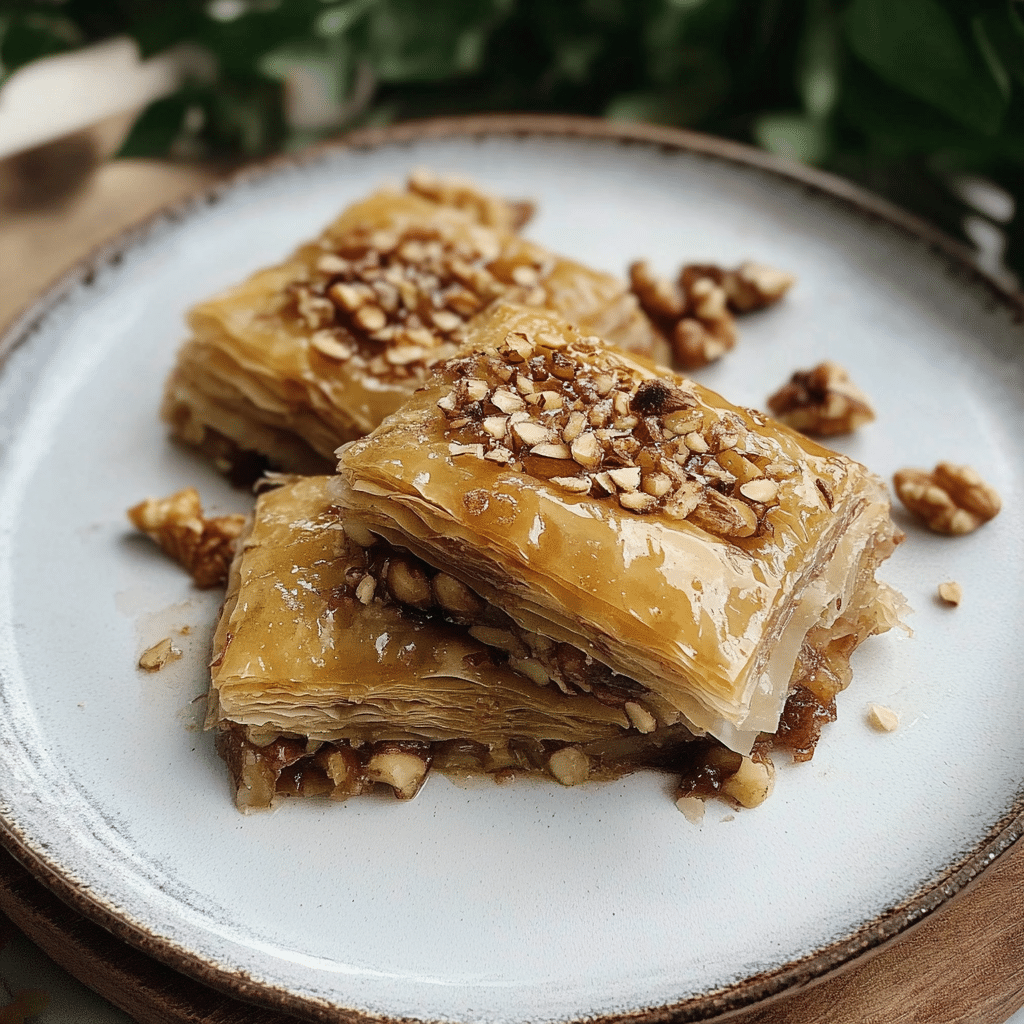
Serving and Storage Tips for Walnut Baklava
Best Ways to Serve
Baklava is best enjoyed at room temperature, allowing the syrup to fully infuse into each layer. Traditionally, it’s served alongside a cup of coffee or hot mint tea, enhancing its sweetness and offering a balance of flavors. For an elegant presentation, garnish with a sprinkling of finely chopped walnuts or a drizzle of additional rose water just before serving.
How to Store Rose Water Walnut Baklava
While baklava can be stored at room temperature in an airtight container for up to 10 days, refrigeration extends its shelf life to nearly three weeks. However, as refrigeration might slightly alter its texture, it’s typically best enjoyed within the first few days when the phyllo remains crisp.
Common Mistakes to Avoid When Making Walnut Baklava
Avoiding Soggy Walnut Baklava
One of the most common mishaps when making baklava is creating a soggy end product. This often stems from either over-saturating with syrup or a lack of balance between syrup application and cooling. The key is to ensure that either the syrup or baklava is warm (not both) when pouring the syrup over it. This method optimizes absorption without compromising texture.
Preventing Burnt Walnut Baklava
To avoid burning your baklava, be sure to keep a close eye during the final stages of baking. Rotate your baking sheet midway if necessary, ensuring even cooking. Additionally, the quality of your oven can vary, so consider using an oven thermometer to maintain precise temperatures, especially when nearing completion.
Chef's Helpful Tips
- Phyllo dough dries out quickly, so always keep it covered with a damp cloth while working.
- For the nut mixture, ensure a consistent chop to guarantee even distribution and flavor.
- If opting for butter instead of ghee, clarify it first to avoid overly greasy layers.
- When cutting the baklava before baking, use a sharp knife to ensure clean, defined shapes.
- Experiment with different nuts, such as pistachios, for a diverse flavor profile.
Choosing the Right Ingredients
The essence of any outstanding dish lies in its ingredients. Always choose premium quality phyllo dough, fresh walnuts, and pure rose water to realize the full potential of this recipe. The quality of these ingredients directly impacts the fragrance, flavor, and finally, the joy this dessert imparts to its tasters.
Mastering the Walnut Baklava Layering
Layering is pivotal in baklava preparation, lending it that delicate, crispy texture. As you alternate between phyllo and the nut mixture, remember to maintain equal pressure when applying ghee. Distributing it evenly over each layer is essential, ensuring none of the phyllo sheets dry out or become overly soaked.
You Must Know
- Phyllo dough sheets can tear easily, so handle with care and take your time during assembly.
- Adjust the level of sweetness by varying the sugar content in both the filling and syrup.
- For an added zest, subtly incorporate lemon rind into the syrup for a citrus undertone.
- Baklava improves with a bit of rest, so consider making it a day ahead of serving.
Nutritional Information
Per serving, this baklava is a rich source of energy, offering protein and healthy fats from the walnuts, alongside calories from the phyllo dough and syrup. However, given its sweet nature, it’s best savored in moderation, recognizing it as a delectable treat rather than a staple food.
Health Benefits
While indulgent, this baklava highlights some nutritional perks thanks to its walnut content. Walnuts are renowned for containing omega-3 fatty acids, which support heart health along with antioxidants that contribute to reducing inflammation. These qualities make this dessert not only a pleasure for the palate but also beneficial, enjoyed in moderation.

FAQs:
The baklava is done when it has taken on a uniform golden-brown color, indicating even baking. Ensure to check its readiness by gently pressing a section with a spoon; if it remains firm and does not readily collapse, it’s typically ready to be taken out of the oven.
Absolutely! Baklava can be made ahead of time and stored for several days. In fact, some baklava connoisseurs claim its flavor intensifies after resting for a day, as the syrup soaks through each layer, enriching the overall taste. Always store it in an airtight container to maintain its freshness.
Yes, there are gluten-free phyllo dough options available in specialty grocery stores or online. These versions might handle slightly differently, so follow the packaging instructions closely regarding defrosting and handling, while maintaining the rest of the recipe’s integrity.
Rose water should have a distinct floral aroma and taste, lacking any bitterness or off-odors. If your rose water doesn’t offer its characteristic scent or has been stored for several years, it might be time to replace it. Fresh rose water is vital for achieving the desired flavor profile in your baklava.
Leftover phyllo dough can be repurposed in various ways. Consider using it in savory recipes like spanakopita, or create mini layered desserts. Always wrap it tightly in plastic and store in the freezer to keep it fresh for future use.
Conclusion on Making the Best Rose Water Walnut Baklava
Crafting Rose Water Walnut Baklava is akin to performing a delicate culinary dance, requiring precision, passion, and patience. Mastering this art not only rewards the taste buds but also pays homage to a timeless tradition upheld over centuries. As you venture on this flavorful journey, remember that the quality of ingredients determines the integrity of the outcome. With the right touch, you’ll create a dessert that’s more than just a sweet treat—it’s a cultural experience.
To dive deeper into the art of baking, be it baklava or other delightful pastries, you might consider visiting sites like Serious Eats for additional techniques and insights or checkout our vibrant matcha green tea cupcakes, a must try experience. Happy baking!
More Easy Baking Recipes:
- Delightfully Flaky Blueberry Cream Cheese Danish Brunch
- Vibrant Matcha Green Tea Cupcakes with Fluffy Vanilla Cream
- Blackberry Lemon Bars Zesty: Easy Summer Dessert Recipe
- Decadent Keto Chocolate Lava Cake: 5-Ingredient Dessert
Recommended
📖 Recipe Card
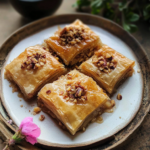
Ultimate Guide to Rose Water Walnut Baklava
- Total Time: 1 hour 15 minutes
- Yield: 8 servings
Description
This walnut baklava recipe offers a masterful blend of traditional Middle Eastern flavors, with aromatic rose water and crunchy walnuts layered in crisp phyllo. Ideal for celebrations or an indulgent treat, it brings a festive, exotic touch to your dessert table.
Ingredients
- Phyllo dough
- Chopped walnuts
- Rose water
- Melted butter
- Granulated sugar
- Honey
Instructions
- Preheat the oven to 350°F and prepare a baking tray by lightly greasing it.
- Layer the phyllo dough in the tray, brushing each sheet with melted butter and sprinkling evenly with chopped walnuts.
- Drizzle rose water over the layers and repeat the process until all ingredients are used.
- Bake until golden and crisp; then pour a sugar-honey syrup infused with extra rose water over the hot baklava and let it cool before serving.
Notes
Use high-quality rose water and fresh walnuts for the best flavor and texture. Keep phyllo dough covered to prevent drying out and brush each layer with melted butter for optimal crispiness.
- Prep Time: 30 minutes
- Cook Time: 45 minutes
- Category: Dessert
- Method: Baking
- Cuisine: Middle Eastern
Nutrition
- Serving Size: 1 piece
- Calories: 250
- Sugar: 15g
- Sodium: 150mg
- Fat: 12g
- Saturated Fat: 5g
- Unsaturated Fat: 7g
- Trans Fat: 0g
- Carbohydrates: 30g
- Fiber: 2g
- Protein: 4g
- Cholesterol: 35mg
Keywords: empty

